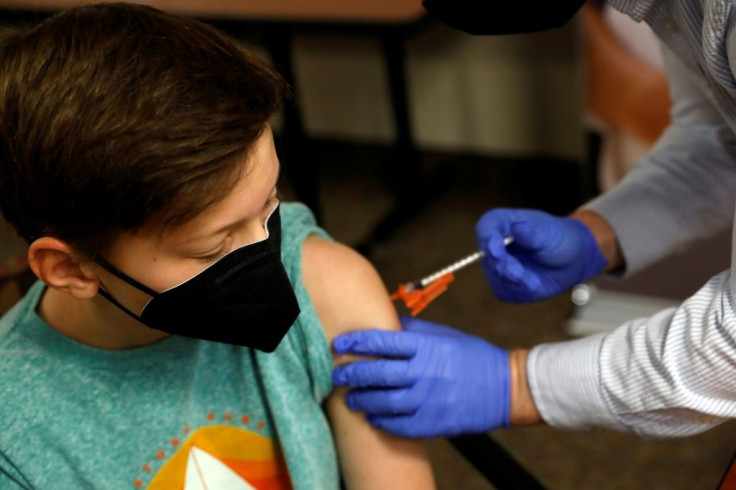Pfizer Lifts Outlook As Covid-19 Vaccine Drives Results
Pfizer again boosted its 2021 profit and revenue outlook on Tuesday, bolstered by the latest surge in Covid-19 vaccinations, including regulatory approvals for boosters and shots for younger children.
Shares of the drugmaker surged as Pfizer said it now expects to deliver 2.3 billion doses in 2021 of the Covid-19 vaccine jointly produced with Germany's BioNTech. That is 200 million more than the company forecast in July by the company that announced an increase in its research and development budget tied to the vaccination push.
Pfizer has steadily lifted its 2021 revenue projection for Covid-19 vaccine sales, now looking at 2021 sales of $36 billion up from $33.5 billion estimated in July and $15 billion in January.
Executives speaking on a call with Wall Street analysts expressed confidence about the "durability" of its coronavirus vaccine-related activity beyond 2022, for which it already expects revenues of $29 billion for some 1.7 billion doses.
This includes anticipated government contracts to stockpile vaccines in case of future outbreaks.
US health authorities on Friday approved Pfizer's vaccine for children aged five to 11, paving the way for 28 million young Americans to soon get the shot against the disease.
Chief Executive Albert Bourla said the company had about three-fourths of the US market share in late October and about 80 percent in the European Union, the result "of our booster being the first to receive emergency use authorization and our two-dose series being preferred by some countries around the world for use in certain younger populations."
In the most recent quarter, the company brought in $24.1 billion in revenue, more than double the level in the year-ago period, with $13 billion tied to the Covid-19 vaccine.
Profits shot up to $8.1 billion, compared with $1.5 billion in the year-ago period.

Pfizer increased its 2021 research and development budget by $400 million due to more projects on Covid-19 vaccines and related mRNA-based projects, now estimating spending in a range of $10.4 billion to $10.9 billion.
The press release described clinical research on an influenza mRNA vaccine under development, "the first in a planned wave of Pfizer investigational programs leveraging mRNA technology."
While Pfizer's financial performance has thrived thanks to the Covid-19 vaccine, the company has been criticized by non-governmental organizations for placing profits above public health in its dealings with governments over the shot.
A recent report by advocacy group Public Citizen accused the company of "bullying" authorities and called for the US government to assume greater leverage with the company.
Pfizer has defended its actions, saying Tuesday that it plans to sell one billion doses to the US government "at a not-for-profit price to be donated to the world's poorest nations at no charge to those countries."
Pfizer has said previously the profit margin on the vaccine is in the "high 20s" in terms of percentage of revenues, with profits from sales to higher-income countries offsetting sales at cost to poorer nations.
Of the 2022 projected revenues tied to confirmed contracts with governments, most of the sales to higher income countries are in boosters or for the pediatric populations, while the sales to lower-income countries are for a mix primary doses and boosters, Pfizer officials said.
Excluding the Covid-19 vaccine, Pfizer lowered its 2021 revenue forecast slightly and raised its profit outlook modestly.
The company saw higher sales of anti-blood clot drug Eliquis and of the heart drug Vyndaqel.
Sales were dented somewhat by a recall of Chantix, an anti-smoking drug. Pfizer enacted a voluntary recall of the drug due to a "theoretical potential increased cancer risk in humans," the Food and Drug Administration said in September.
Pfizer shares ended at $45.45, up 4.1 percent.
© Copyright AFP 2024. All rights reserved.





















